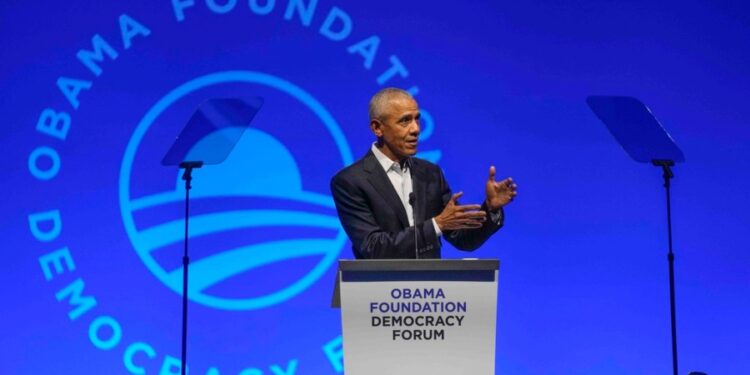
Many a post-mortem has been written on why Kamala Harris lost the election. Democrats should have had a primary. Joe Biden should have dropped out sooner (or not at all). Democrats have lost touch with the working class. Sen. Bernie Sanders (I-Vt.) was right. And so on.
One thing that has seemingly remained unquestioned, however, is the presidency of Barack Obama. Indeed, there is a general sense that the Democratic Party needs to find its next Obama to defeat the right. But Obama’s presidency must also be reexamined in this Democratic soul-searching.
As he was stumping for Harris in 2024, Obama claimed that the pre-covid economy Donald Trump was taking credit for was really “his” economy. But what about the economy of 2010, with close to 10 percent unemployment? Or of 2013, with 7.4 percent unemployment? Wasn’t that Obama’s economy too?
After the 2020 election, I wrote an op-ed arguing that Joe Biden would do well to remember the mistakes of Obama’s presidency and not be timid with his economic policies. The rise of Trumpism, I argued, had been driven largely by economic factors. Although the economy was doing relatively well by the time Trump was elected in 2016, the recovery from the Global Financial Crisis had been the slowest in modern history when it came to the labor market.
It took about 10 years for the unemployment rate to go down to the pre-recession levels. The labor force participation rate never recovered. Obama let the banks get away with the financial crisis, unscathed, while failing to help homeowners reeling from declining home prices and high debt burdens. The social and economic destruction that the crisis wrought, I argued, was the main reason Democrats lost many voters (and hence the election) to Trump in 2016.
I sent the op-ed to a liberal friend who liked it but cautioned it would never be published in any mainstream outlet. Obama was still too highly regarded and beloved among Democrats. Any critique of him would not see the light of day. She was right.
Of course, Obama was not much different from the Democratic administration that had had preceded him — that of Bill Clinton. While Obama’s presidency was marred by inaction in the face of the Global Financial Crisis, Clinton proactively dismantled New Deal safeguards and signed NAFTA. He bragged about achieving a government surplus, which meant that the government was taking out more from the economy than what it was putting in. In other words, U.S. households and businesses combined were financing Clinton’s surplus by running deficits.
Although Clinton’s star has faded, Obama’s still shines brightly. Democrats may argue that there is not much Obama could have done differently, given Republican resistance. The problem is, he didn’t really try. He chose Larry Summers as the director of his National Economic Council. It is now well-known that Summers sabotaged a larger fiscal stimulus that could have made a major difference in the trajectory of the recovery. (As the COVID crisis demonstrated, a rapid recovery is possible with the appropriate economic policies.)
Aid to homeowners was never prioritized. Obama argued that “We are out of money” and willingly presided over fiscal austerity, claiming that the federal government had to tighten its belt just as households were doing. He chose the path of bipartisanship and incrementalism, wasting the immense opportunity for progressive reform that the crisis presented.
The times called for an FDR and another New Deal. Instead, we got more third-way centrism.
The irony is that former President Joe Biden’s economic policies were better than those of both Obama and Clinton. Yet Biden also failed to deliver on many of his campaign promises: raising the minimum wage, forgiving student debt and, importantly, making some of the pandemic-era social programs (such as expanded child tax credits and food assistance) permanent. He also failed to dd new social programs such as universal pre-k and paid leave. As a result, Americans temporarily got a glimpse of what a good government safety net looks like, then promptly lost it.
Although inflation can be blamed to some extent for the election outcome, the seeds of economic discontent that threaten to make the Democratic Party obsolete were sown long ago. The party establishment wanted to believe that the 2016 election was an anomaly. That position is no longer tenable. And without a hard pivot toward progressive economic policies, the 2020 election may end up being the outlier.
Yeva Nersisyan is associate professor and department chair of Economics at Franklin and Marshall College.






